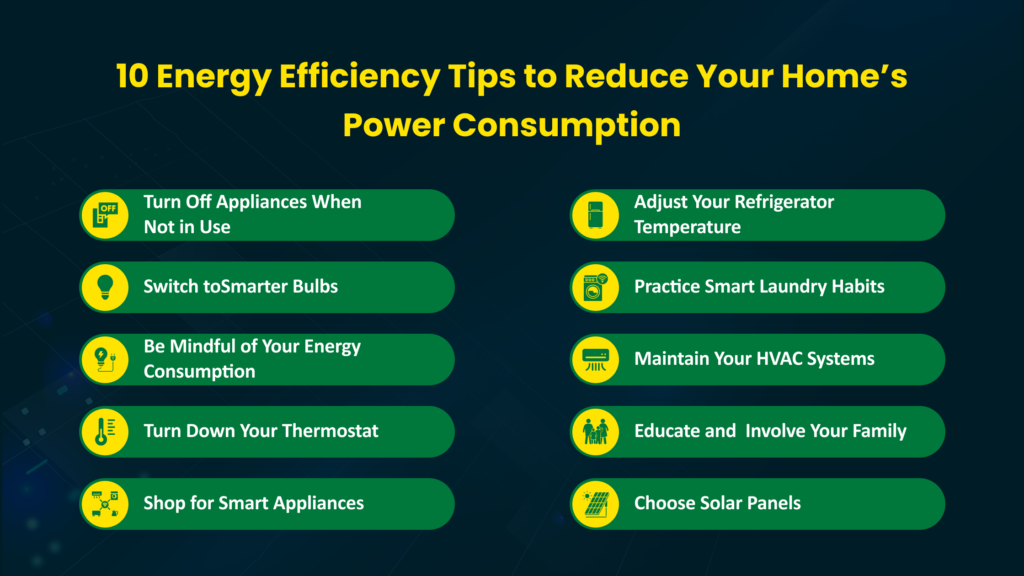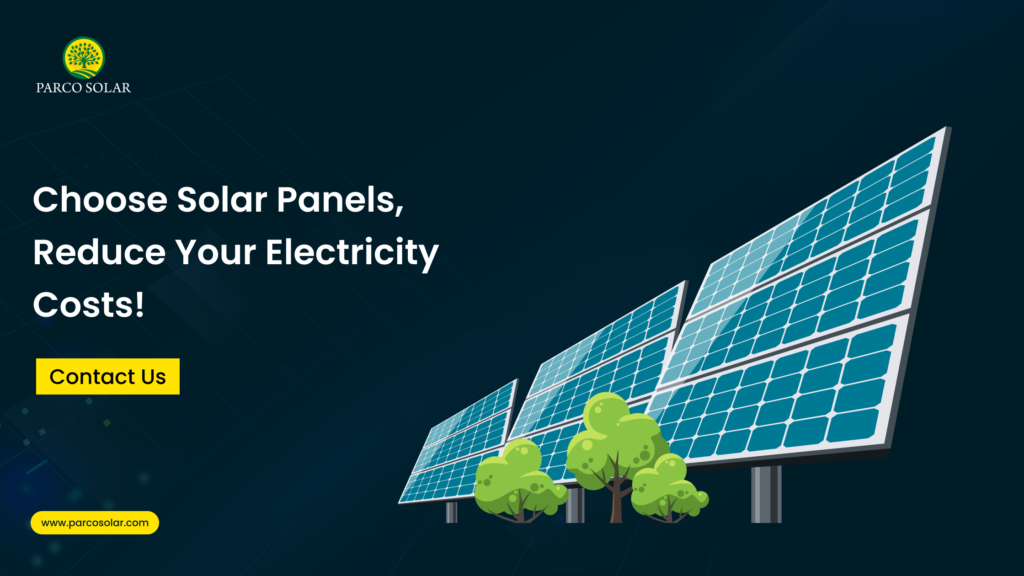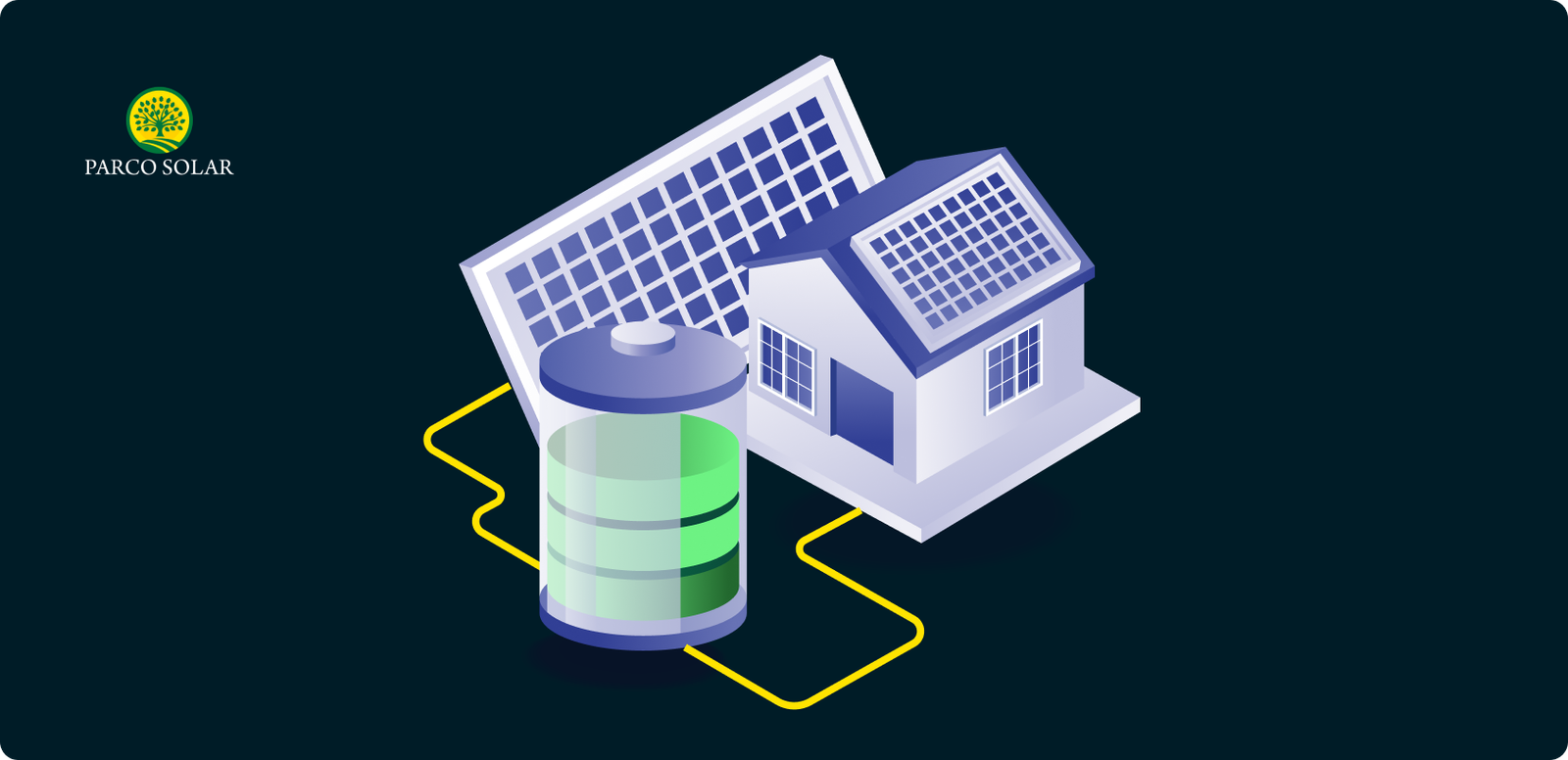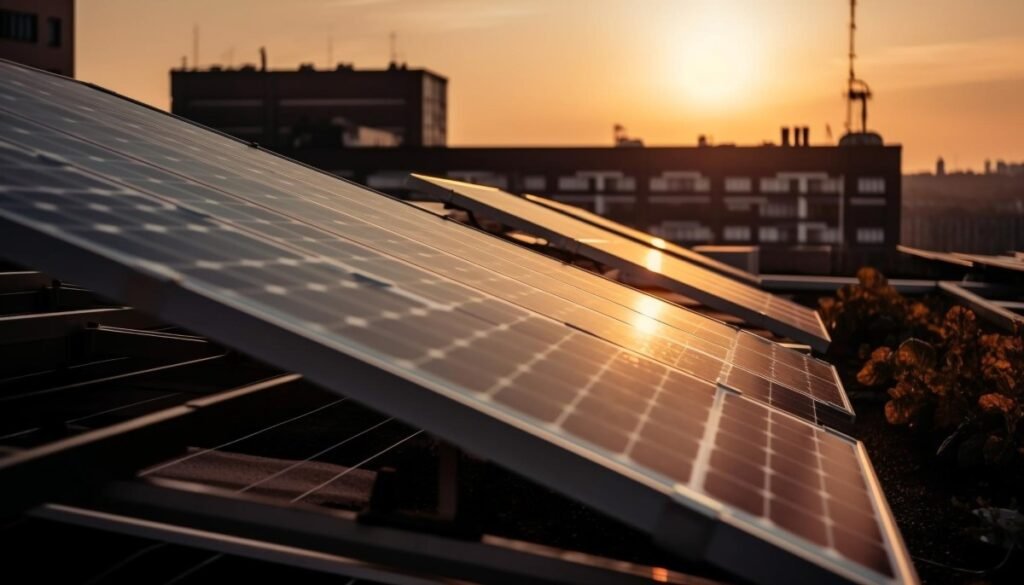Do you feel the pinch every time your electricity or utility bill arrives? Do high energy costs have you scrambling to manage your household budget? Are you looking for ways to cut down on energy without sacrificing comfort?
Many of us dread that moment when we have to see how much our energy usage costs us. The good news is that there are simple and effective ways to reduce electricity consumption and, consequently, those bills. From tweaking daily habits to investing in energy-efficient appliances, it’s possible to slash those hefty bills.
We will take you through the top ten energy-efficient ways to reduce your home’s power consumption, which will reduce costs and increase energy efficiency. Don’t believe us? Let your electricity bill speak for itself!
10 Energy Efficiency Tips to Reduce Your Home’s Power Consumption

Here are the top ten tips to make your home energy efficient and reduce power consumption:
- Turn Off Appliances When Not in Use
A simple yet strategic way to reduce energy consumption in your home is to turn off appliances when they are not in use. We don’t mean switching off the light when you leave the room, but that’s important, too. We are referring to electronic devices and appliances that continue to draw power even when turned off, a phenomenon known as “standby power,” with the standby power usage sometimes colloquially referred to as a “vampire load” or “phantom load.”
Standby power consumption can account for up to 5% to 10% of your home electricity use and could cost you $100 annually. Devices like televisions, chargers, computers, and kitchen appliances often have a standby mode, allowing them to start up quickly but at the cost of continuous energy consumption. Here are a few tips to help you minimize your standby power usage:
- Unplug Unused Devices: Unplugging appliances you don’t frequently use, such as kitchen gadgets or additional electronics, is a simple and effective way to reduce standby power.
- Utilize a Power Strip: Connect your electronics to a power strip with on-and-off switches. Turning off the power strip when your devices aren’t in use ensures you aren’t draining additional power.
Moreover, it helps you protect electronic devices from electrical surges. - Choose Certified Products: Consider investing in certified appliances, such as those certified by ENERGY STAR. These appliances are designed to be more energy-efficient and have lower standby power consumption than non-certified models.
- Switch to Smarter Bulbs
Upgrading the lighting in your home to smart LED bulbs is an easy way to reduce energy usage and save on your electricity bills. LEDs use up to 90% less energy and last up to 25 times longer than traditional incandescent bulbs. This significant reduction in energy use directly translates to lower electricity costs.
Moreover, LEDs provide excellent light quality that can be customized to fit various settings. It may surprise some, but LED lights come in different shapes, sizes, and intensities, which help you customize your lighting based on your mood. Not all LED lights need to be super bright and white! Whether you need bright white light for a kitchen or a softer glow for relaxing in the living room, LEDs have you covered!
- Be Mindful of Your Energy Consumption
Conserving energy in your home isn’t just about choosing the right appliances or upgrading to the latest technologies; it is about adopting mindful habits that ensure you use only as much energy as you need.
Start by understanding which appliances and devices are essential and when they are necessary. For example, only run the dishwasher or washing machine with full loads. This reduces the number of cycles you run, saving water and energy.
Make it a habit to turn off lights when you leave a room. Consider installing motion sensors in less-frequented areas, like bathrooms or the laundry room, so the lights only activate when needed and turn off automatically.
- Turn Down Your Thermostat
A survey revealed that space heating is the biggest energy consumer in the average American home, accounting for 42% of energy consumption and costing $519 on average. You can start by adjusting your thermostat to the lowest comfortable setting in winter and the highest comfortable setting in summer. Even a tiny adjustment of 1 or 2 degrees can lead to substantial savings over time.
Consider using a programmable or smart thermostat that automatically adjusts temperatures based on your daily schedule and sleeping hours, reducing energy use when you’re away or asleep. Optimizing heating systems conserves energy, enhances comfort, and saves money.
- Shop for Smart Appliances
Upgrading your home with energy-efficient equipment is one of the most effective ways to reduce energy consumption and save on utility bills. Energy efficiency is typically measured by standardized ratings such as Energy Star in the U.S., which indicates that the equipment meets or exceeds specific efficiency standards set by the government.
These ratings help consumers identify and choose products that save energy without sacrificing features or functionality. Always look for these labels when shopping for new appliances. Here is how you can switch to energy-efficient equipment:
- Consider upgrading your furnace, air conditioner, or heat pump to one with a high Seasonal Energy Efficiency Ratio (SEER) and Energy Efficiency Ratio (EER).
- Opt for a refrigerator with a top-mounted freezer, which uses 10-25% less energy than side-by-side models or those with an ice maker.
- Look for washing machines and dryers that use less water and have higher spin speeds, which extract more water and reduce drying time.
- Adjust Your Refrigerator Temperature
The refrigerator uses a lot of energy and contributes the most to your electricity bill because it operates continuously. Adjusting the temperature settings of your refrigerator and freezer can help reduce the power consumed, ensuring they run efficiently without overcooling.
The ideal temperature for your refrigerator must be between 35 and 38 degrees Fahrenheit (1.7 to 3.3 degrees Celsius). This range is cold enough to keep food fresh and safe but not so cold that the refrigerator has to work unnecessarily hard, which would increase energy consumption. Similarly, set your freezer at 0 degrees Fahrenheit (-18 degrees Celsius). This temperature is sufficient for preserving food and preventing bacteria growth without causing the freezer to overexert itself.
- Practice Smart Laundry Habits
Laundry is a routine chore in most households but also represents a significant portion of domestic energy and water consumption. Water heating contributes about 12% of total energy usage in an average US home. One of the simplest changes you can make is switching to cold water for most laundry loads. Cold water is adequate for most laundry needs and can significantly reduce energy consumption; it’s gentler on fabrics, helping your clothes last longer.
Additionally, run your washing machine and dryer only when you have a full load. This practice maximizes the efficiency of each wash and dry cycle, reducing the frequency of runs and, thus, the energy used over time. However, avoid overloading as it can stress the washer’s motor and poorly washed clothes, which often require a second wash, doubling the energy and water use.
- Maintain Your HVAC Systems
Regular maintenance of your Heating, Ventilation, and Air Conditioning (HVAC) system is crucial for its efficiency, effectiveness, and longevity. A well-maintained HVAC system keeps your home comfortable throughout the year, helps reduce energy consumption, and prevents costly repairs.
A simple yet most effective way to maintain your HVAC system is to regularly change or clean the air filters. Dirty filters restrict air flow, reducing efficiency and making the system work harder, increasing energy costs. You must check the filters every month and change or clean them as needed, typically every 90 days or sooner if you have pets or a dusty environment.
Even with regular homeowner maintenance, an annual inspection by a qualified HVAC technician is essential. They will check the system for issues you might not detect, such as problems with the electrical connections, motor, and thermostat. The technician can also ensure the system runs efficiently and suggest necessary repairs or replacements.
- Educate and Involve Your Family
Creating a sustainable home is not just about making physical changes to your environment; it’s also about cultivating a sustainability mindset within your family. Educating and involving your family in eco-friendly practices can significantly impact your collective energy consumption and instill lifelong habits that benefit the environment.
Begin by educating your family about the reasons behind and the benefits of sustainable living. Discuss topics like climate change, the importance of conserving resources, and how energy consumption impacts the environment. Use age-appropriate language and materials to engage children and ensure that everyone understands the significance of their actions.
Children and other family members are more likely to follow suit when they see you practicing sustainability daily. Whether it’s consistently recycling, turning off lights when leaving a room, or choosing to walk or bike rather than drive, your actions can inspire and motivate others in your household to act.
- Choose Solar Panels
Opting for renewable energy sources is a powerful way to reduce your electricity bill while reducing your carbon footprint. Solar panels, in particular, have become a popular and viable option for homeowners seeking clean energy. Once installed, solar panels significantly reduce or even eliminate your electricity bills. The sun provides free energy, and with solar panels, you can harness this energy to power your home.
The Benefits of Switching to Solar Panels
Here’s how choosing solar panels for electricity and power can benefit you:
Environmental Impact: Solar panels provide clean, green energy that reduces carbon footprint. Unlike fossil fuels, solar energy production generates no harmful pollutants or greenhouse gasses, making it environmentally friendly.
Reduced Energy Costs: Solar panels significantly reduce utility bills by utilizing the sun’s power. Forbes reveals that installing solar panels can save you anywhere from $25,500 to $33,000 on electricity expenses. Over time, the initial investment in solar technology can be recouped through these savings, making it economically advantageous.
Increased Property Value: Properties equipped with solar energy systems often see an increase in value, making them more attractive to potential buyers. A study reported that homes with solar panels saw a 4% increase in value compared to homes without solar panels. This is due to solar panels’ prospective cost savings on energy.
Low Maintenance Costs: Solar energy systems are durable and require minimal maintenance over their productive lifespan, which can span 25 years or more. After installation, the ongoing costs associated with solar panels are significantly lower than those associated with other forms of power generation.
Government Incentives: Many governments offer substantial incentives for solar panel installation, such as tax breaks, rebates, and grants. For example, the Federal Tax Credit offers up to a 30% rebate on the price of a new solar installation. These incentives can reduce the upfront costs and help homeowners reap long-term savings sooner.
However, it is essential to note that your solar system can help you save expenses only if you choose one that caters to your specific energy needs. Simply attaching solar and using a ton of additional energy does not help you save! That’s why it is always important to consider how to make your energy usage more efficient.
If you are unaware of how efficient your household energy consumption is, Parco Solar is a company that can provide you with a free energy efficiency audit and identify areas where you can reduce your energy consumption.
Choose Solar Panels, Reduce Your Electricity Costs!

Switching to solar power systems can be overwhelming, but Parco Solar seeks to help make the switch easier and more gratifying.
Parco Solar, short for Park and Company Solar, is proud to be an AAPI-owned company dedicated to making the process of going solar and making your home more energy efficient simpler, effective, and cost-efficient. We are a local company dedicated to providing a quality customer experience, and we serve the greater Los Angeles area, Orange County, and Inland Empire!
We offer top-tier products, such as solar panels, inverters, battery storage, etc, for your properties at a transparent price that maximizes your value. That’s not all; as mentioned, we offer a free energy-efficient audit to help you break down your household energy consumption and identify areas where you can reduce power consumption. We also install solar panels promptly and attentively to ensure a smooth transition to an efficient, sustainable energy supply!
Save Money, Save the Planet!
Contact Us

With a dedication to renewable energy and expertise in creating compelling content, Susan regularly offers insights on the latest trends and best practices in solar energy solutions and energy efficiency methods.



